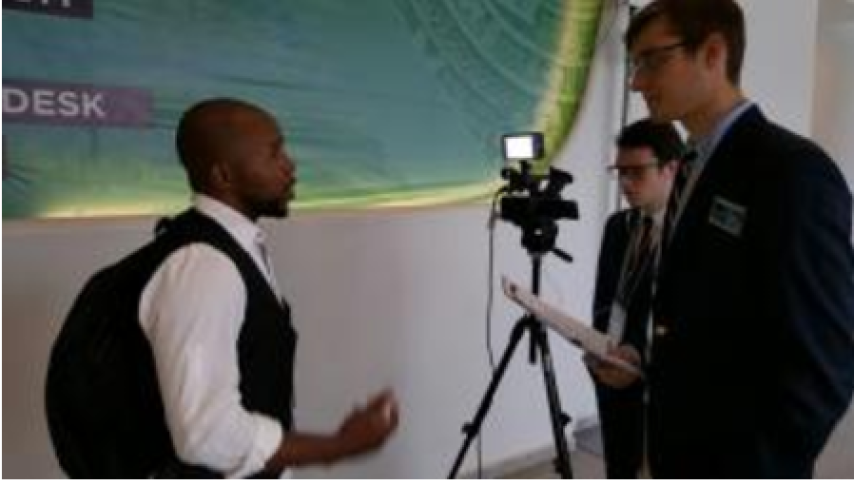
 Masibulele being interviewed during IGF 2016.My name is Masibulele Siya, but I’m also known as Jay where I live in rural Eastern Cape in South Africa. I was born in the mid-1980’s and raised in these rural areas, but I left my homeland for about seven years for educational purposes. In 2008, I started to work at a local non-profit organisation, where I was positioned as a teacher of the community elders and children between the ages of seven to 16 years old. Working for this organisation, particularly teaching elders, I learned different valuable lessons about the values in my culture and how to approach and develop rural communities, so that they can evolve effectively.
Masibulele being interviewed during IGF 2016.My name is Masibulele Siya, but I’m also known as Jay where I live in rural Eastern Cape in South Africa. I was born in the mid-1980’s and raised in these rural areas, but I left my homeland for about seven years for educational purposes. In 2008, I started to work at a local non-profit organisation, where I was positioned as a teacher of the community elders and children between the ages of seven to 16 years old. Working for this organisation, particularly teaching elders, I learned different valuable lessons about the values in my culture and how to approach and develop rural communities, so that they can evolve effectively.
In 2012, I got involved with a communications project established by the University of the Western Cape. Its mission is to provide a Wi-Fi network in Mankosi community, creating a platform for university senior researchers to visit the area for research purposes and providing a sustainable developmental project that looks at economic and social factors while highly respecting the culture of the community. This involved the introduction of a low-cost mesh network, a low-energy system using scattered node devices rather than central masts. The project, officially registered as a co-operative, is called Zenzeleni – “do it yourselves” in the isiXhosa language. It is aimed at helping this community to find solutions for the problems it is facing.
The University of the Western Cape believes people worldwide, and especially in rural communities, need to discover for themselves the best way to address the challenges they face. The university’s role is to assist processes to reach optimally developed and fairly sustainable rural communities.
The IGF experience
In December 2016, I attended the Internet Governance Forum (IGF) in Guadalajara, Mexico with the support of APC’s Member Exchange and Travel Fund (METF). The experience was definitely eye-opening for me personally and for the Zenzeleni Telecommunications Network. The themes from the different discussions I took part in at the forum are already being shared among the members of the cooperative, which is holding meetings monthly.
The cooperative members have been really amazed to hear how good the work they are doing is for their community, and how it is opening up possibilities for other communities in Africa. Zenzeleni Cooperative is operating in deeply disadvantaged conditions in rural South Africa. These areas are always left behind in all sorts of development initiatives. Zenzeleni Cooperative has achieved a lot in terms of creating ownership of projects in Mankosi, but there is also still a lot that needs to be considered happening on ICT platforms which will also uplift Zenzeleni Cooperative. This include layers such as gender equality, cultural differences, economic issues and levels of education, which still need strong consideration in this project.
These are the main angles that I brought with me from the IGF. However, most of these layers could only be introduced and put into practice by Zenzeleni Cooperative and the entire Mankosi community once the network connectivity gets set up. We find this practical style of doing things suitable in Mankosi community, because it fits different people with different levels of education. We think the Zenzeleni network will be up and functioning by the end of February 2017, and this is when we will be initiating great reforms on gender equality and also looking at other restrictions preventing the use of ICT platforms.
Attending the IGF gave me the opportunity to network with different people and organisations from different parts of the world: communities with one common goal of understanding various problems facing different communities, trying to find solutions for the problems that restrict access to the internet, incorporating multiple strategies from different nations and cultures. Although it is not easy to get everything you may need to learn, especially for the beginners like me, it has been really amazing to join the IGF for the first time.